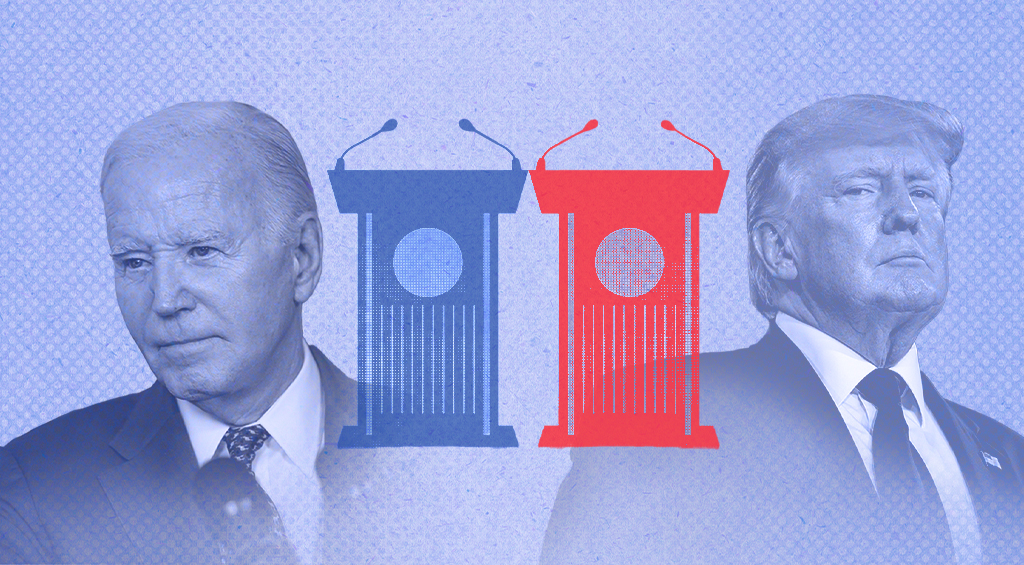UPDATED Jun. 28, 2024, at 3:30 PM
By Aaron Bycoffe, Amina Brown, and Nathaniel Rakich
President Joe Biden’s performance at the first presidential general-election debate on Thursday night has sparked widespread criticism, not only from pundits reacting in real-time but also from American voters, as revealed by a new 538/Ipsos poll conducted using Ipsos’s KnowledgePanel.
Biden’s delivery, characterized by hoarseness and stumbling, immediately instilled panic among many Democrats about their prospects in November. However, despite the uproar, the poll indicates that the debate did not significantly alter voters’ perceptions of either candidate.
Respondents were surveyed on their expectations and evaluations of each candidate’s performance using a five-point scale ranging from “excellent” to “terrible,” with each response converted into a numerical score from 1 to 5. Biden received an average performance score of 1.99 out of 5, lower than his already modest expectations score of 2.62 among the same respondents. In comparison, Trump slightly exceeded expectations, scoring 3.04 out of 5 on performance after an expected score of 3.00.
The debate seems to have intensified concerns about Biden’s suitability for the presidency, with voters rating him lower on both physical (2.23 out of 5) and mental fitness (2.27 out of 5) after the event. Conversely, Trump’s scores on both metrics slightly improved post-debate, with his physical fitness score rising from 3.06 to 3.16 and his mental fitness score from 2.79 to 2.88.
In terms of emotional fitness for office, Biden maintained a slight edge over Trump, with average scores of approximately 2.8 and 2.6 respectively, before and after the debate.
When directly comparing their performances, Trump emerged as the clear winner according to debate watchers, with 60% favoring his performance compared to 21% for Biden. Meanwhile, the debate’s impact on voter intention showed a slight decline for Biden, with 46.7% of likely voters considering voting for him post-debate, down 1.6 percentage points from before.
Trump’s support remained relatively stable, edging up from 43.5% to 43.9% post-debate. Interestingly, third-party candidates saw gains, with Robert F. Kennedy Jr., Jill Stein, and Chase Oliver all increasing in potential support.
While both candidates remain unpopular overall, Biden’s net favorability rating dipped slightly post-debate (from -19.4 to -20.2), while Trump’s improved marginally (from -20.8 to -19.4). A significant portion of likely voters (21%) hold unfavorable views of both major-party candidates, often referred to as “double haters,” whose voting decisions could prove pivotal in the upcoming election.
Key issues like inflation, immigration, political extremism or polarization, and abortion continue to shape voter preferences, with Trump perceived as better equipped to handle economic concerns and Biden favored on issues of extremism and abortion.
This analysis is based on polling conducted by Ipsos for 538 using Ipsos’s KnowledgePanel, ensuring a representative sample of the U.S. population. The survey compared responses before and after the June 27, 2024 debate, providing insights into voter sentiment and candidate performance.
For more details on methodology and additional information, visit the full report on 538/Ipsos’s website.
Editing and project management by Tia Yang. Copy editing by Cooper Burton. Quantitative editing by Geoffrey Skelley. Visual editing by Katie Marriner. Additional contributions by Mary Radcliffe and Holly Fuong. Original design and visual editing by Humera Lodhi and Christopher Groskopf. Art by Gabe Vogl.
source: fivethirtyeight.com


